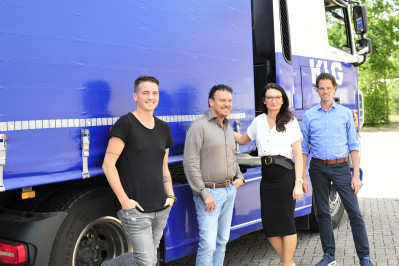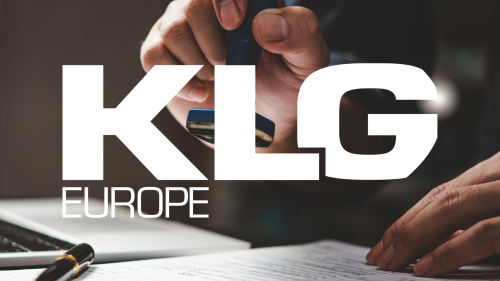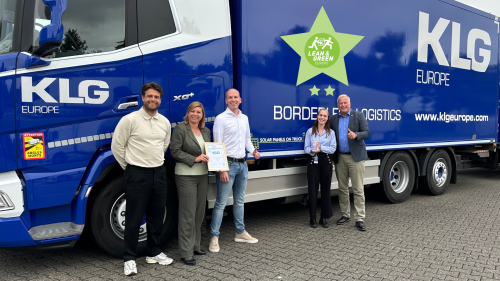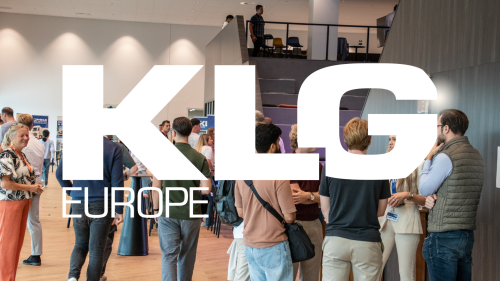Standing still is going backwards
16 mei 2022The challenges in the logistics sector are enormous. Recruiting and retaining personnel is becoming increasingly difficult. At the same time, new technologies and the global situation are affecting business operations. Through the project “Logistics learning without borders”, Fontys Venlo, together with companies like KLG Europe, prepare students and professionals for the future. KLG Europe is enthusiastic about the collaboration and underlines the importance of a learning culture on the work floor.

Yvonne Peeters, KLG Europe: ‘Standing still is going backwards’
Logistics learning without borders is an umbrella project that includes several programmes, such as social innovation and “Dare2share”, in which a pool of students, trainers and companies work together to tackle problems and share knowledge. According to the parties involved, in this rapidly changing world full of technological and supply chain challenges, you need to develop.
Stimulating learning culture
With this project, Fontys Venlo, together with companies such as KLG Europe and Vervoerscollege Venlo, prepare students and professionals for the future. “We encourage a learning culture”, says Yvonne Peeters, Executive Assistant at KLG Europe. “This means that you have to allow mistakes to be made. By offering employees training opportunities, they continue to develop. It reduces the outflow of staff, because employees feel challenged. Furthermore, because of the introduction of new techniques and systems, it is important that the theory at school matches the practice. So, you have to bring your future employees, the students, into contact with this at an early stage.” KLG Europe is opening its doors. “Soon, together with Fontys, we will be organising a student challenge (Hackathon) for first-year students”, says Peeters.
Opening up for sharing
For KLG Europe, it is important that other companies also dare to encourage a learning culture organisation and therefore calls on companies to open themselves up to this. “Of course we are eager to share, but the new knowledge must also come from somewhere”, says Peeters.
“In that way you can keep up with today’s world quickly”
“You see that we get a lot of new information from projects that are part of Logistics learning without borders and that you give it a place in your organization in a certain way. You can then share that information in that network. I Think that in this way you can keep up the world as it is today very quickly by sharing the information with each other.
Inspiring students
According to Peeters, you often do not have the time to figure something out yourself, because by the time you have, that innovation is already four times faster. Peeters understands that it can be difficult for companies to share your business information. “On the other hand: you can know the ingredients, but that does not mean you are giving away the recipe. Just by showing what happens in the warehouses, you can make students enthusiastic”, says Peeters.
More complex professions
“Standing still is going backwards”, says Peeters. “You notice that the world changes so quickly, especially now with the Corona crisis and the critical situation in Ukraine. The customer is at this moment more king than ever”, says Peeters. According to Peeters, the time frame in which logistics must be practised these days is tight, while the customer’s wishes are becoming more and more challenging.
“Working together brings new knowledge into the organization”
“Because we have become very accustomed to ordering something today that will then be on the doorstep tomorrow, professions have become more complex; so the planner who only guides a driver has long since disappeared. He has become a spider in a web who knows something about everything”, says Peeters. “We have a large group of loyal colleagues and that is great, but it does not mean that knowledge can be outdated. Working with schools and other companies ensures that you get new knowledge into the organization.”
Norms and values
The “Logistics learning without borders” project is in line with KLG Europe’s norms and values as an organization. “We want to continue to develop as an organization in a way that suits everyone. We accept the employee who is very keen to grow, but also the colleague who is actually quite happy with the way things are going”, says Peeters.
Interaction
According to Peeters, the interaction between trainers and companies brings theory and practice closer together. There is a clear interaction of knowledge within the project. “It ensures that you, as an organization, keep a sharp eye on things. Students can apply to us for an internship assignment and stick around, which is a great way of boosting our influx. We are very closely involved in various projects and parts of the education system, we co-write teaching materials and several projects. We are also going to collaborate in writing the curriculum for the Associates degree education.
Lifelong development
Once started in logistics, the development of skills continues. “KLG Europe understands like no other that you need to make staff eager to keep learning”, says Roy Fleuren, director at Vervoerscollege Venlo, also one of the affiliates. “If you know at what level your employees are acting, you also know how strong the organization is and where you have gaps in your personnel policy. That is how you work towards a competence-based organization.” Vervoerscollege Venlo has been active for years as a training provider within transport and logistics. “Functions change rapidly. Learning on the job is becoming more and more important. As with the project “Logistics learning without borders”, it is important to offer accessible, practice-oriented information”, says Fleuren.
Looking at the person
The product that KLG Europe delivers as a logistics service provider is a service. Peeters therefore thinks it is important that, as a company, you look more at those who make the service and therefore add value to the product; the people. “The more you are aware that the machine room consists of a lot of colleagues, instead of real machines, the more you realise that it is weird not to invest in your employees”, says Peeters. “You also buy a new printer when it is broken or when a new more advanced model is released, right?”
“You also buy a new printer when it is broken, right?”
Improving brand awareness
Improving the brand awareness of the logistics sector is one of the main reasons for KLG Europe to participate in the project. “We noticed that the transport and logistics sector is a sector that you fall in love with, but you are not automatically attracted by its image. But if the culture and the work do not suit someone, then it stops quickly”.
“We all still have a huge battle to make”
I think we still have a huge battle to make there. By showing that logistics is not a sector where it only smells of diesel, where it is dusty, where only men work, where you are pushing around in a cold warehouse. That is only a very small part of a very nice big sector that contributes enormously to the economy. But we can only improve that reputation if we do it together”, concludes Peeters
Source: Article Logistiek.nl (article in Dutch)
More news
We would like to get in touch with you.










